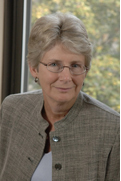The meaning of a massacre
University Lecture explores 16th century slaughter of French Protestants

This year’s University Lecture showcases the scholarship of Barbara Diefendorf, a College of Arts and Sciences professor of history. She will speak tonight, October 25, on the subject Blood Wedding: The Saint Bartholomew’s Day Massacre in History and Memory. Established in 1950 to honor faculty engaged in outstanding research, the University Lecture provides an opportunity for members of the BU community — as well as the general public — to hear a distinguished scholar discuss a topic of recognized excellence. The lecture begins at 7:30 p.m. at the Tsai Performance Center, 685 Commonwealth Ave.
BU Today spoke with Diefendorf on the still murky causes of France’s 1572 Saint Bartholomew’s Day Massacre.
BU Today: Who was behind the Saint Bartholomew’s Day Massacre?
Diefendorf: Many people have believed that the massacre was plotted in advance by Queen Mother Catherine de Medici as a way of ridding France of its Huguenot (Protestant) population. The Huguenots had engaged the Crown in three civil and religious wars during the previous decade. Each time, financial circumstances had forced the Crown to reach a compromise peace. This situation was not acceptable to the growing faction of radical Catholics, who wanted Protestantism eliminated entirely, and the inability to solve this continuing problem weakened the king’s authority. There were more specific issues involved — Catherine was said to be jealous of the growing influence Protestant leader Gaspard de Coligny had over the young king, Charles IX — but in essence, the traditional argument is that she decided to put an end to an intractable problem through murder.
What were the true causes?
The true causes are still debated. Most historians no longer believe that the massacre was plotted in advance. Rather, it was a response to unforeseen events, and in particular to the failure of an attempt to assassinate Gaspard de Coligny on August 22. My argument, first advanced in my book Beneath the Cross: Catholics and Huguenots in Sixteenth-Century Paris, is that the king ordered the assassination of the Huguenot leadership on the eve of August 24 because of rumors that the Huguenots were so angry at the attempt to assassinate Coligny that they were planning to seize the royal family and effect a political coup. The king’s advisors convinced him that the only way to ward off this coup was to act first and to kill the Huguenot leaders. It was, I believe, the noise made by the king’s troops as they went through the streets searching out the lodgings of the leaders that set off the popular massacres — the murders of civilians by the Parisian populace. This was not intended or planned in advance and was instead the result of a long-standing hatred of Huguenots as dangerous heretics on the part of the Parisian populace.
Almost half of the real estate was owned by clergy. How did that influence the desire to eliminate Protestants?
There is a lot of misinformation out there about Saint Bartholomew’s Day. Online sources (including the Wikipedia, but especially a respectable-sounding but rabidly anti-Catholic Web site called reformation.org) give very unreliable accounts of the massacre. It is not true that the Catholic Church owned half the property in France. This is wildly exaggerated, and although it is true that benefiting from church patronage kept some aristocratic families firmly in the Catholic camp, there was no connection between the massacre and the church’s ownership of property in France.
How did the exodus of Protestants from France after the massacre change life in the rest of Europe and the New World?
French Protestants were on the whole a well-educated and enterprising minority. They contributed their skills and work ethic to communities that welcomed them in Prussia, the Netherlands, England, and what would become the United States.
How would our lives be different today if there had been no massacre?
The massacre set in motion important currents that, over the long run, helped end religious persecution and promote tolerance. It prompted some people to look for a political solution to France’s religious quarrels, and the compromises these people arrived at always included measures of toleration for religious difference. At the same time, it launched the critique of divine-right monarchy and monarchical absolutism that we see emerge in the writings of John Locke and other familiar political theorists.
What can we learn about life today from the events of the massacre? What parallels do you see between religious uprisings then and now?
For me, the biggest lesson we can learn from the massacre is about the disastrous clashes that can occur when competing faiths claim a monopoly on absolute truth — when people are so convinced not only of the truth of their religious principles but also of the error of those who differ from them that they are led to engage in acts of persecution or violence on this account. Every set of religious uprisings has its origin in a particular combination of social, political, and religious factors. It would be reductionist to attribute them all to the same set of causes, but to the extent that religion is a motivating factor, it is this element — the conflicting claims to be acting on absolute truths that are in fact unknowable — that they have in common. This is what leads people to justify killing others because they are “heretics,” or “ungodly,” or somehow offensive to the eyes of God and therefore a pollution of the social body that must be eliminated.